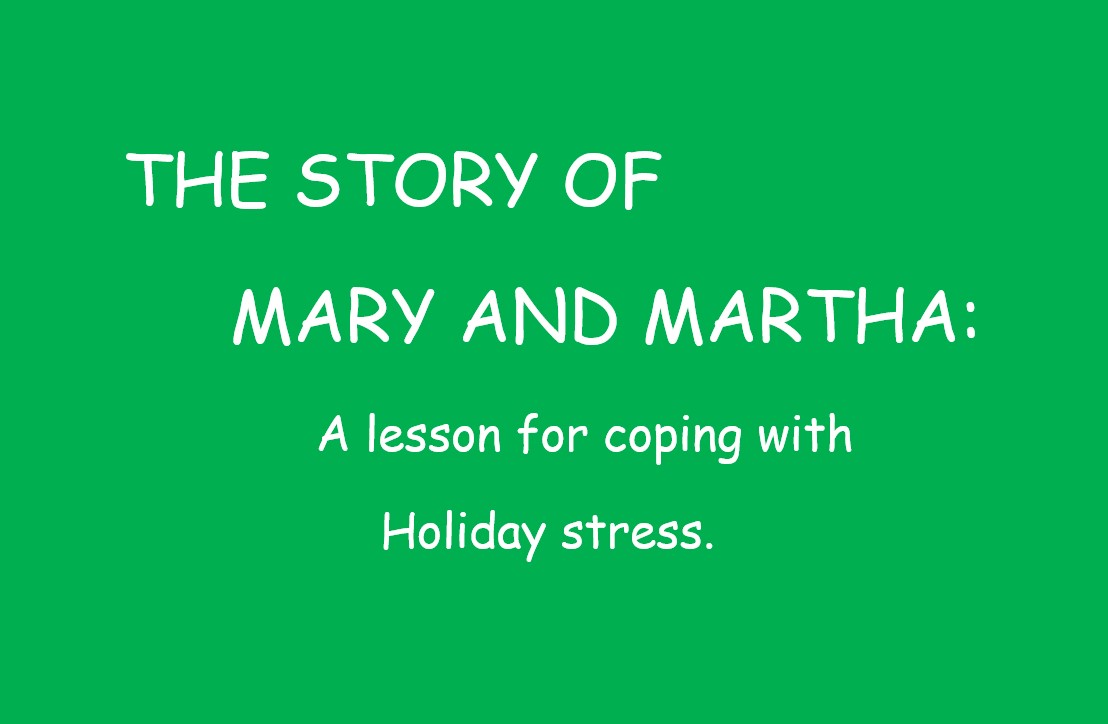
2024 has been a rough year. As we head toward the finish line, holiday gatherings can add even more stress. https://revmichaelheath.com/reducing-stress-around-the-holidays-a-pastoral-counseling-approach/
As a pastoral counselor, I’m asked what advice the Bible has for dealing with the holidays. Actually, one story is particularly helpful. , Indeed, the story of Mary and Martha (Luke 10: 38-42) is as relevant today as it was 2000 years ago. This beloved biblical classic has an important lesson for those who struggle with family and social gatherings at this time of year. https://uihc.org/health-topics/coping-holiday-anxiety-and-stress
THE TEXT
“Now, as they went on their way, he entered a village, and a woman named Martha received him into her house. 39 And she had a sister called Mary, who sat at the Lord’s feet and listened to his teaching. 40 But Martha was distracted with much serving, and she went to him and said, “Lord, do you not care that my sister has left me to serve alone? Tell her then to help me.” 41 But the Lord answered her, “Martha, Martha, you are anxious and troubled about many things; 42 one thing is needful. Mary has chosen the good portion, which shall not be taken away from her.” (Lk 10.38-42 RSV)
THE HUMAN STORY
I believe this story is so popular because the situation is so realistic. It’s easy to imagine two sisters living together who invite a prominent religious figure to their home.
The older sister, Martha, is a worrier and a little OCD. She wants to make a good impression on her special guest. Mary is more carefree and able to live in the moment.
Amidst trying to make sure that everything is “just so,” Martha notices that Mary, instead of helping her, is just sitting there with Jesus. Despite her best intentions to be a good hostess, Martha loses it and snaps, asking Jesus to rebuke Mary and tell her to help her.
Responding, Jesus turns to Martha, and instead of criticizing Mary or offering to pitch in to help her, he calls Martha by name. In doing so, Jesus empathizes with her. He recognizes that Martha’s anxiety keeps her from realizing what is really important in the moment. Ironically, in trying so hard to serve the Lord, Martha could not be fully present with him.
THE TRADITIONAL MESSAGE
Traditionally, some preachers use Martha as a negative example, i.e., we should not be caught up in the lesser important things of life. A common criticism of Martha was that she was too worried about external concerns. Put another way, she asked Jesus into her house but not into her heart.
That said, many folks find this story difficult because they identify with Martha’s frustration. Besides that, the story feels incomplete. It ends without revealing Martha’s reaction to Jesus’ words. (I imagine her weeping and falling into Jesus’ loving arms.)
The Dynamics of Anxiety and Stress
Instead of looking at the story as a criticism of Martha, I appreciate it as a vivid portrayal of human nature and how family tensions can boil over under the stress of social gatherings.
Jesus explicitly identifies anxiety as the underlying problem behind Martha’ angry outburst. Indeed, the story of Mary and Martha illustrates a fundamental assumption of psychotherapy, i.e., that most surface-level problems have underlying and unaddressed causes.
Instead of chastising Martha, Jesus expresses understanding and compassion toward her as he praises Mary.
__________________________________________________
Turning to the holidays, Mary and Martha provides a valuable lesson. It reminds us to be mindful when approaching social gatherings. The story also demonstrates how vulnerable we are to losing a reasonable perspective and getting caught up in petty conflicts. Thinking ahead allows us to anticipate predictable difficulties and avoid them. Besides anticipating the future, reviewing problems from prior years can also prevent us from repeating the same mistakes. Making small changes can lead to better results.
For example, if Martha had sat down with Mary and discussed plans for the visit in advance and asked Mary to help, my sense is that things would have gone more smoothly.
In addition to managing situations better, having increased understanding helps us be more empathic with stressed-out folks. Realizing that anger outbursts are signs of a person being triggered can prevent us from being triggered or taking personal offense. With these thoughts in mind, here are a couple of tips for hosting or attending holiday parties:
— For yourself: Be aware and monitor your stress level before and during any social gathering. If the level starts to climb, withdraw before it boils over and hit the reset button.
— For others: Be understanding. Be present without arguing or challenging. If someone is obviously triggered, don’t respond. Instead, nod or shrug.
— Most of all, keep perspective and recognize what is important this time of year when we gather to celebrate the season’s joys.
With a little thought and understanding, Christmas and New Year’s get-togethers can minimize frustrations and create wonderful occasions to celebrate and enjoy being together with those you love. Best wishes for a loving holiday season and a happy new year!
Rev, Michael Heath, LMHC, Fellow AAPC 12 4 2024



